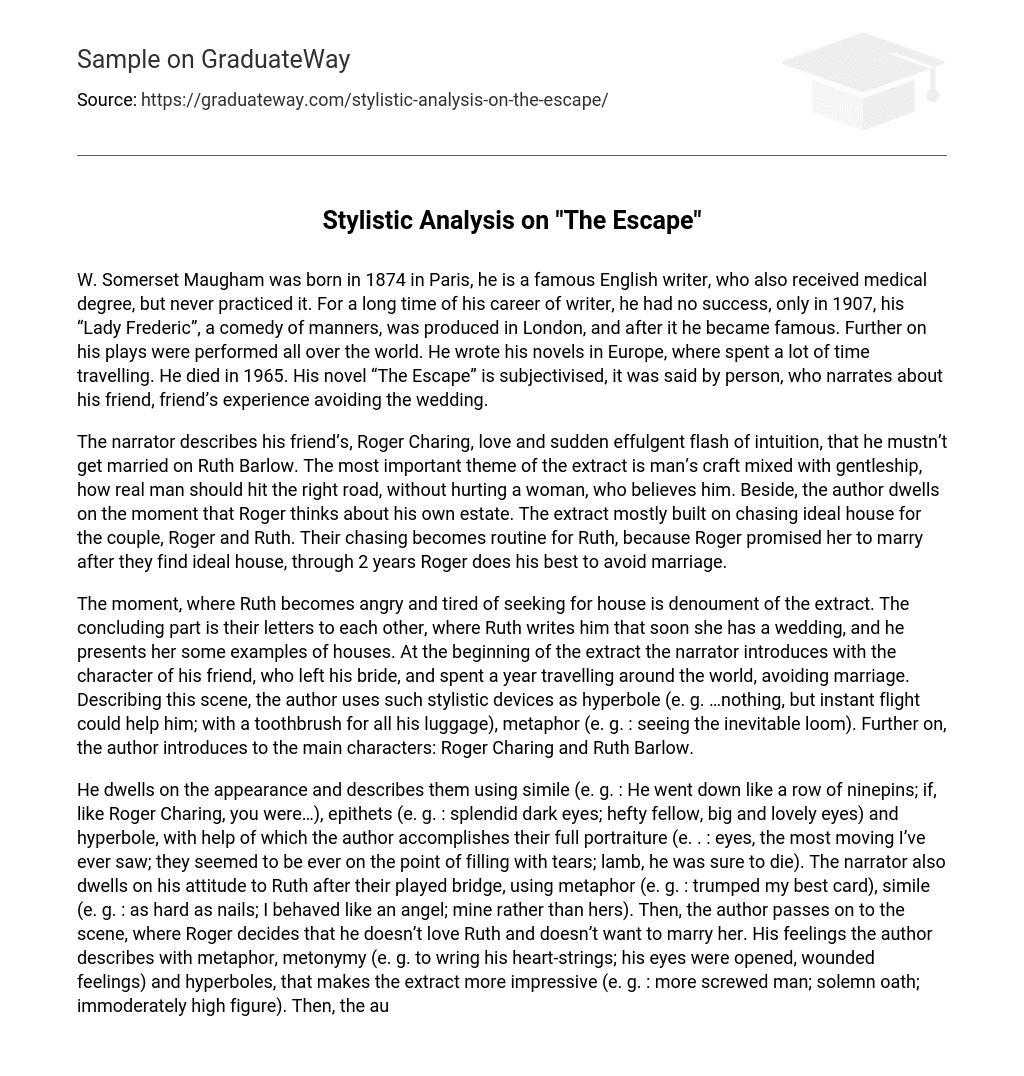W. Somerset Maugham was born in 1874 in Paris, he is a famous English writer, who also received medical degree, but never practiced it. For a long time of his career of writer, he had no success, only in 1907, his “Lady Frederic”, a comedy of manners, was produced in London, and after it he became famous. Further on his plays were performed all over the world. He wrote his novels in Europe, where spent a lot of time travelling. He died in 1965. His novel “The Escape” is subjectivised, it was said by person, who narrates about his friend, friend’s experience avoiding the wedding.
The narrator describes his friend’s, Roger Charing, love and sudden effulgent flash of intuition, that he mustn’t get married on Ruth Barlow. The most important theme of the extract is man’s craft mixed with gentleship, how real man should hit the right road, without hurting a woman, who believes him. Beside, the author dwells on the moment that Roger thinks about his own estate. The extract mostly built on chasing ideal house for the couple, Roger and Ruth. Their chasing becomes routine for Ruth, because Roger promised her to marry after they find ideal house, through 2 years Roger does his best to avoid marriage.
The moment, where Ruth becomes angry and tired of seeking for house is denoument of the extract. The concluding part is their letters to each other, where Ruth writes him that soon she has a wedding, and he presents her some examples of houses. At the beginning of the extract the narrator introduces with the character of his friend, who left his bride, and spent a year travelling around the world, avoiding marriage. Describing this scene, the author uses such stylistic devices as hyperbole (e. g. …nothing, but instant flight could help him; with a toothbrush for all his luggage), metaphor (e. g. : seeing the inevitable loom). Further on, the author introduces to the main characters: Roger Charing and Ruth Barlow.
He dwells on the appearance and describes them using simile (e. g. : He went down like a row of ninepins; if, like Roger Charing, you were…), epithets (e. g. : splendid dark eyes; hefty fellow, big and lovely eyes) and hyperbole, with help of which the author accomplishes their full portraiture (e. . : eyes, the most moving I’ve ever saw; they seemed to be ever on the point of filling with tears; lamb, he was sure to die). The narrator also dwells on his attitude to Ruth after their played bridge, using metaphor (e. g. : trumped my best card), simile (e. g. : as hard as nails; I behaved like an angel; mine rather than hers). Then, the author passes on to the scene, where Roger decides that he doesn’t love Ruth and doesn’t want to marry her. His feelings the author describes with metaphor, metonymy (e. g. to wring his heart-strings; his eyes were opened, wounded feelings) and hyperboles, that makes the extract more impressive (e. g. : more screwed man; solemn oath; immoderately high figure). Then, the author passes on to the scene, where Roger keeps his own counsel, continuing show her attention to all her wishes. But there’s one moment, that Roger promised Ruth to marry, when they will find a house, that suits them. Their chasing the narrator images with anaphora (e. g. : repeating of the word “sometimes”).
The story ends with the moment, when Ruth becomes tired and with “unaccustomed hardness” in her voice asks Roger about their marriage, but after the answer he gives, soon she informs him that she gets married. Roger, as wise and crafty man, says that he disappointed about it and sends her seven orders to view. The general slant of the story is ironical. To sum up, the extract shows the psychology of men and women, how do they react on wedding and what could do a man avoiding marriage without hurting woman. I think that nowadays this extract may be considered as a lesson to men.





